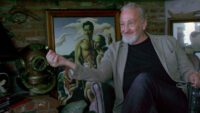It’s rare that a movie is quite so primed for comparison as Sofia Coppola’s latest piece, Priscilla. Of a piece with her 2006 biopic of another of history’s most iconic wives, Marie Antoinette, her biographical drama following the romance that bloomed and soured between rock and roll star Elvis Presley and timid young fan Priscilla, sheds an altogether less flattering light on the singer than last year’s much acclaimed biopic Elvis. Even the film’s title, the first-name mononym, feels like a challenge to that film’s authenticity and credibility. Baz Luhrmann’s Elvis told the singer’s tale through his relationship with his exploitative manager Col. Tom Parker. Coppola’s tells it through his equally exploitative relationship with his wife.
For what it’s worth, Priscilla Presley heartily endorsed Luhrmann’s film, but this one is based on her own memoir and executive produced by the woman herself. As much as she sung her praises of Luhrmann’s film, there was clearly another side to the story that she wanted to tell, and she wasn’t alone. Elvis’s abusive behavior, his addiction, his infidelities, are all common knowledge, and many felt Luhrmann’s film was a betrayal of the facts, stylistically heightening the good parts of the singer while downplaying the bad. His film tells us he fell in love with “the teenage daughter of an officer”, it neglects to specify that the “teenage” she was was fourteen, and what Elvis did to her was undoubtedly what we call today grooming.
Coppola’s film begins just then, when the lonely Priscilla (Cailee Spaeny), far from home, in a foreign country, gets invited to a party at Elvis Presley’s house. As any heterosexual fourteen-year-old girl might’ve been, she’s ecstatic, and begs her parents to let her go. These early scenes in Germany and Graceland are the best part of the movie. Perhaps it’s because it’s so much easier to enjoy the film when its depicting the happier times, maybe because the later stuff falls too neatly into cliché.
But Spaeny is astounding as Priscilla throughout the film, managing to credibly play Priscilla from fourteen into her late twenties. As the young Priscilla, she’s shy and gawky, but funny, determined, endearing, and very, very small. Spaeny won the Best Actress Award at the Venice Film Festival for her work and it’s clear why, I hope she’s a contender in this Spring’s awards race, she puts so much into her character and carries the film on her tiny shoulders. Her performance and the way Coppola films her make it perfectly clear to the audience exactly how young fourteen is.
As Elvis, Jacob Elordi has if anything, a tougher part to play. Imitating one of the most iconic, recognizable and yes, one of the greatest performers of the twentieth century is no short order, and it’s made all the tougher by having to follow Austin Butler, whose Oscar-nominated performance was as magnetic as it was downright spooky. In comparison, Elordi tries his best, but he doesn’t even particularly look the part, he never even gets paunchy later in life, and his mumbled impression of Elvis’s voice isn’t really up to par, when you can even understand what he’s saying. It’s not a bad performance, as his first appearance does capture the electricity around the most famous man in the world, but it does really go to show just how good Butler was, and why he had to put all that work in.
From their initial arranged meet-cute, the film unfolds almost as a series of anecdotes following the ups and down of Priscilla and Elvis’s relationship. A great many of these anecdotes are amusing, in a “tsk-tsk” kind of a way, Priscilla is an extremely endearing character to follow, and her relatable warmth coupled with the absurd world Elvis pulls her into does create some extremely entertaining sequences. Other moments however are genuinely shocking and upsetting. Given the material, it could well feel like a character assassination, even if accurate. Audiences are rarely receptive to being told that their icon was a controlling, sexist, demanding, violent man, much less being shown it. But this is Sofia Coppola we’re talking about here, and despite the occasional shallowness of the film’s script, Coppola brings it to life with her decorous approach. She understands the life of a bored, lonely teenage girl who just wants some romance and excitement and Priscilla finds the promise of them with Elvis.
Priscilla can’t match Elvis as far as spectacle goes. Production designer Tamara Deverell is mostly restricted to a handful of the same locations: Priscilla’s home in Germany, Elvis’s home in Germany, Graceland, their L.A. pad, a Vegas hotel room etc. The budget doesn’t stretch to recreating the iconic set pieces Luhrmann mounted with such bombastic relish—the movie doesn’t have the rights to use Elvis’s own music, giving Coppola a good excuse to indulge in some of her favorite anachronistic needle-drops—but the more intimate nature of the story here means it doesn’t have to. Priscilla is largely excluded from that side of Elvis’s life, just left to “keep the home fires burning” while Elvis goes on tour, films movies, has sex with other women and doesn’t have sex with Priscilla. Still though, Coppola takes as much delight as Luhrmann did in recreating the period, and the two each have their own spin on an anachronistic approach.
Priscilla Presley was a style icon and the film revels in that, with Deverell and costume designer Stacey Battat going all out with some gorgeous sets and costumes, all shot with ravishing luster by cinematographer Phillippe le Sourd. Stopping on your way to the maternity ward to put on your false eyelashes? Iconic. And really what are you doing if your range of sidearms aren’t color-coordinated to go with your dresses? Coppola knows to keep the girlish fantasy angle alive. There’s an illicit thrill to experiencing this kind of decadence, you need something to keep you in it.
I’m sure Priscilla won’t compete with Elvis at the box office, and if you want to see a celebration of Elvis’s career as a performer then yeah, stick with pantomime villain Tom Hanks and the Doja Cat soundtrack, but for my money, I probably found Priscilla more entertaining. Yes, the script isn’t the most enlightening or boundary pushing thing I’ve ever seen, it doesn’t have the audacious approach that say, Spencer took to similar material. But Priscilla boasts the uncomplicated pleasures of an innately likable lead, some exquisite photography and Coppola’s typically languid, dryly funny approach to a story that’s at its most endearing here.
If you were left frustrated by Elvis‘s obfuscations, then you can join team Priscilla. Personally, and I think I’m going to be fairly alone in this, I like both movies about as much, but I think the majority of people are going to massively prefer one or the other. I’m very glad that this movie exists. Coming out of Elvis something like this felt necessary, honestly, and though Priscilla doesn’t erase Elvis‘s charms any more than the man’s abusive behavior and appropriation of black culture erase his talent, it gives us an equally accurate, equally incomplete version of events, and one with just as much poignance and truth to impart.




